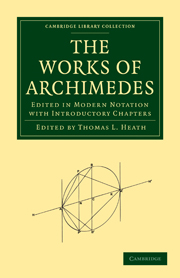
-
Select format
-
- Publisher:
- Cambridge University Press
- Publication date:
- September 2010
- September 2009
- ISBN:
- 9780511695124
- 9781108006156
- Dimensions:
- Weight & Pages:
- Dimensions:
- (216 x 140 mm)
- Weight & Pages:
- 0.65kg, 520 Pages
You may already have access via personal or institutional login
Book description
Archimedes lived in the third century BC, and died in the siege of Syracuse. Together with Euclid and Apollonius, he was one of the three great mathematicians of the ancient world, credited with astonishing breadth of thought and brilliance of insight. His practical inventions included the water-screw for irrigation, catapults and grappling devices for military defence on land and sea, compound pulley systems for moving large masses, and a model for explaining solar eclipses. According to Plutarch however, Archimedes viewed his mechanical inventions merely as 'diversions of geometry at play'. His principal focus lay in mathematics, where his achievements in geometry, arithmetic and mechanics included work on spheres, cylinders and floating objects. This classic 1897 text celebrates Archimedes' achievements. Part 1 places Archimedes in his historical context and presents his mathematical methods and discoveries, while Part 2 contains translations of his complete known writings.
Contents
Metrics
Full text views
Full text views help Loading metrics...
Loading metrics...
* Views captured on Cambridge Core between #date#. This data will be updated every 24 hours.
Usage data cannot currently be displayed.
Accessibility standard: Unknown
Why this information is here
This section outlines the accessibility features of this content - including support for screen readers, full keyboard navigation and high-contrast display options. This may not be relevant for you.
Accessibility Information
Accessibility compliance for the PDF of this book is currently unknown and may be updated in the future.


